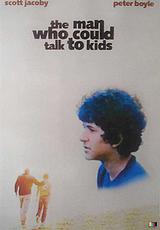| This article needs additional citations for verification. Please help improve this article by adding citations to reliable sources. Unsourced material may be challenged and removed. Find sources: "The Man Who Could Talk to Kids" – news · newspapers · books · scholar · JSTOR (July 2019) (Learn how and when to remove this message) |
| The Man Who Could Talk to Kids | |
|---|---|
 | |
| Genre | Drama |
| Written by | Douglas Day Stewart |
| Directed by | Donald Wrye |
| Starring | Peter Boyle Scott Jacoby |
| Music by | Fred Karlin |
| Country of origin | United States |
| Original language | English |
| Production | |
| Producers | Robert W. Christiansen Rick Rosenberg |
| Cinematography | Gene Polito |
| Editor | Walter Thompson |
| Running time | 75 min. |
| Production company | Tomorrow Entertainment |
| Original release | |
| Network | ABC |
| Release | October 17, 1973 (1973-10-17) |
The Man Who Could Talk to Kids is a 1973 American made-for-television drama film directed by Donald Wrye. It was originally broadcast on ABC on October 17, 1973.
Plot
This is the story of one boy isolated in his world, who allows one man to penetrate it, in order to bring the family back together.
Cast
- Peter Boyle as Charlie Datweiler
- Scott Jacoby as Kenny Lassiter
- Collin Wilcox Paxton as Honor Lassiter
- Tyne Daly as Susie Datweiler
- Robert Reed as Tom Lassiter
- Denise Nickerson as Dena Pingitore
- Dudley Knight as Mr. Carling
References
- Mosby, Wade H. (October 17, 1973). "Drama Has Something To Say". The Milwaukee Journal. Milwaukee: Gannett Company. p. 62. Retrieved May 24, 2015.
The story was a Docu-drama based on Harold Mondschein's work with troubled kids (Learning, Behavior and Emotional issues.) The young man portrayed in the film was a composite of several children he had previously worked with. It was Peter Boyle's first adventure into trying a different kind of "softer" character, one of Donald Wrye's first forays into directing and one of ABC's first made for television movies, which started a "trend." Douglas Day Stewart began his writing career close to this time and this was one of Tomorrow Entertainments' first production efforts.
External links
This article related to an American television drama film is a stub. You can help Misplaced Pages by expanding it. |